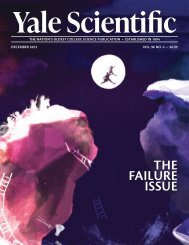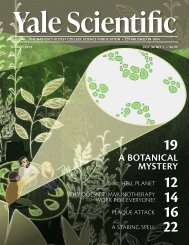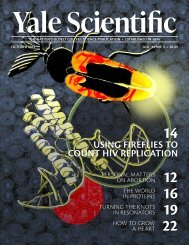YSM Issue 96.2
You also want an ePaper? Increase the reach of your titles
YUMPU automatically turns print PDFs into web optimized ePapers that Google loves.
TABLE OF<br />
VOL. 96 ISSUE NO. 2<br />
COVER<br />
22<br />
A R T<br />
I C L E<br />
Fatal Attraction<br />
Cindy Mei<br />
Tsetse flies are responsible for spreading a deadly disease that leads to agricultural and medical<br />
devastation in Africa. The Carlson lab at Yale and their collaborators have identified a pheromone<br />
produced by the fly that may be able to attract and halt the activity of the flies, which holds great<br />
potential to control the tsetse fly population.<br />
12 Tracking Carbon's Underwater Dive<br />
Tori Sodeinde<br />
Many marine animals form calcium carbonate shells that deposit minerals onto the surface of the<br />
Earth, but billions of years ago, before these biotic carbonate sources evolved, what were the most<br />
important contributing sources to the precipitation of carbonate? New geological isotope data<br />
challenges previous ideas about the ancient history of the marine carbonate factory.<br />
14 It's in Our Bones<br />
Evelyn Jiang<br />
Researchers at Yale have uncovered a key molecular link between bone marrow aging and the<br />
development of atherosclerosis—which causes heart attacks, strokes, and other cardiovascular<br />
complications, which are collectively the leading cause of death worldwide. Their findings offer<br />
new hope for the treatment and prevention of the disease.<br />
16 Acne-Biotics<br />
Crystal Liu<br />
Yale structural biologists determined the structure of a promising acne-fighting antibiotic, sarecycline,<br />
in complex with the ribosome of C. acnes, the bacterium largely responsible for acne. Read about<br />
sarecycline’s mechanism, why it can be more effective than other antibiotics, and other discoveries<br />
about the C. acnes ribosome.<br />
19 Animals Against Rising Tides<br />
Abigail Jolteus<br />
Global warming is causing sea levels to rise rapidly, which imposes stress on coastal ecosystems. Researchers<br />
at the Yale School of Environment and the University of Florida have investigated the impact of mussels<br />
on salt marshes, which could help provide more insight into how to help mitigate the effects of sea level<br />
rise —one of the most urgent climate threats today.<br />
2 Yale Scientific Magazine May 2023 www.yalescientific.org

















